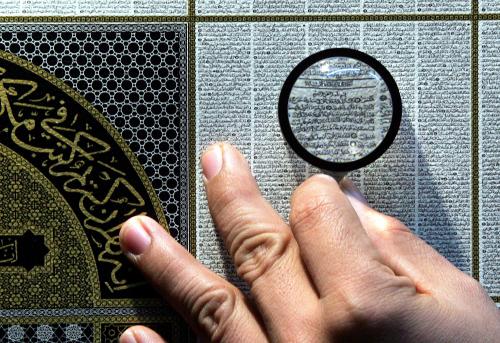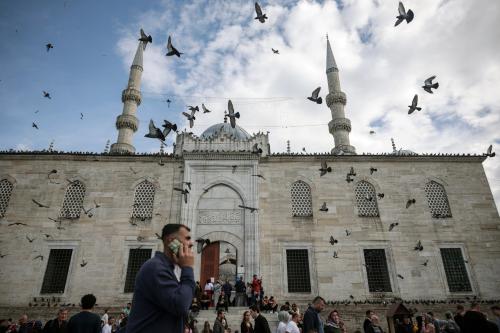In conservative political circles in the United States, Islamism has become interchangeable with “radical Islamic terrorism,” which President Trump has vowed to “eradicate from the face of the Earth.” But what if, Shadi Hamid asks, the reason Islamism makes so many uncomfortable is not the military challenge it poses but the intellectual one? This piece originally appeared in the Washington Post.
In conservative political circles in the United States, Islamism has become interchangeable with “radical Islamic terrorism,” which President Trump has vowed to “eradicate from the face of the Earth.” Across the political spectrum, though, the idea of Islamism and the threat of violence are never far apart.
But what if we got it wrong? What if the prospect of violence is actually secondary? What if, deep down, the reason Islamism makes so many uncomfortable is not the military challenge it poses but the intellectual one?
The very notion of Islamism often elicits fear and confusion in the West. Used to describe political action where Islam and Islamic law plays a prominent public role, it includes everyone from the European-educated “progressives” of Tunisia’s Ennahda Party to the fanatics of the Islamic State. Not surprisingly, then, “Islamism” can confuse more than it reveals.
In 2015 and 2016, we met with a diverse group of Islamist activists and leaders from 10 countries in Doha and Istanbul, outcomes we published in a recent Brookings report. The “twin shocks” of the Arab Spring and the rise of the Islamic State have forced mainstream Islamists—Muslim Brotherhood-inspired groups that accept parliamentary politics and seek to work within existing political systems—to better articulate their worldview and where it converges and diverges with the post-World War II liberal order.
Islamist visions of an ideal future reopen a host of existential and philosophical questions, ones Islamists themselves have struggled to answer or agree on. Our conversations brought out debates and dilemmas that present serious ideological challenges to modern notions of the nation-state, citizenship and the purpose of politics itself.
While the Islamists we talked to unanimously opposed the Islamic State and were disgusted by its brutality, some couldn’t help but look with envy at the group’s ability to shatter “colonial impositions”—the Islamic State’s symbolic razing of the Iraq-Syria border, drawn up by Europeans, is perhaps the most infamous example. It’s not so much the arbitrariness of state borders as much as the fact that they exist.
For the better part of 14 centuries since Islam’s founding, Muslims, living under various caliphates, had seen their primary identity as religious. With the advent of modern states, they were now being asked to transfer their allegiance to a nation, a demand that, to many, felt unnatural—and still feels unnatural. One Muslim Brotherhood member said that “many Arab youth, even those who were not Islamist in the first place, didn’t mind the disappearance of borders that divide countries.”
Another Islamist activist from Jordan reminded us that Muslim Brotherhood founder Hassan al-Banna launched the Brotherhood as an alternative during a time of uncertainty after the abolition of the Ottoman Caliphate in 1924. “Does this mean that Islamist movements accepted or had to accept these borders?” he told us. “We do not accept these borders, but we will work within them.”
A general dislike of modern borders has been a feature of Islamist politics for some time now, and not just among the young and zealous. Turkey’s President Recep Tayyip Erdogan, for example, has been candid on how Turkey’s “emotional borders” extend far beyond those drawn on the map.
Deeper issues Islamists wrestle with include what the state itself should represent, where its jurisdiction begins and ends, and what sort of voice Islam should have in the process. After the Arab Spring, a growing number of Islamists have begun to challenge what they see as uncreative approaches to the state—an overly centralized state, and one which, in its very constitution, is unable to tolerate dissent or alternative approaches to organizing society. There is a sense, as one participant put it to us, that the state actively interferes with everything, including religion. In the time of caliphates, he said, Muslims would talk about the global Muslim community—the ummah.
Some young Islamists, then, appear to have a sort of libertarian streak. Yearning for a dignified past, they want to limit and even weaken their overly centralized—and almost always repressive—states.
The Islamic State doesn’t provide as much of an alternative as it might like to claim. Like the ostensibly secular autocratic regimes ruling the region today, it appears obsessed with forging a strong, domineering state that dictates “proper” religious practice. The Islamic State’s model is actually quite modern, with government control taking precedence over social and religious institutions rising organically from the grass roots.
The idea of a “weak” state buttressed by a robust civil society hints at a pre-modern concept of sovereignty over Muslim people worldwide, rather than over territory. And it is here where Islamists—as well as many conservative Muslims more generally—find their common ground. As the scholar Ovamir Anjum has argued, pre-modern Muslim thought was not concerned with “politics” in the traditional sense, but with the welfare of the ummah—what he cleverly calls “ummatics.” The welfare of Muslims, however, wasn’t only about their lives in this world, but also in the world to come.
For some Islamists, then, politics might be less about territory for its own sake and more about winning over the hearts and minds of Muslims, as a way of furthering religio-political unity. Historically, being able to credibly tout one’s self as the political leader of as many Muslims as possible was precisely how any would-be caliph staked his claim to legitimacy.
In today’s globalized world, Islam, as a religious and political idea, doesn’t reside solely within the borders of any one state or region, which helps explain the appeal of the Islamic State’s strategy to call on Muslims worldwide to fight for the ummah wherever they happened to be—rather than for the security of a single, territorially defined homeland.
What’s discomforting is that many Muslims—and not just the Islamic State or card-carrying Islamists—might prefer, in an ideal world, to be free to pledge their ultimate loyalty to the ummah in the abstract, rather than to a nicely bounded nation-state. And while survey data shows the overwhelming majority of Muslims strongly oppose the group, the Islamic State nonetheless draws strength from ideas that have broader resonance among Muslim-majority populations.
So Islamism may be less of a military challenge and more of an intellectual one, a challenge that we in the West have for too long thought would fade away like the other “isms” before it. Islam’s continued refusal to quietly recede into the private sphere should give us pause.
Maybe the reason Islam hasn’t fallen in line isn’t just the poverty, the lack of education, colonialism or wars. These all play a role, of course. But maybe the ideas Islamism brings to the fore also have a resilience and appeal that we have been reluctant to admit. And maybe the liberal order is not as desired, inevitable or universal as we thought. How the world manages—or mismanages—these challenges is shaping up to be one of the defining issues of our time.
The Brookings Institution is committed to quality, independence, and impact.
We are supported by a diverse array of funders. In line with our values and policies, each Brookings publication represents the sole views of its author(s).








Commentary
Trump has vowed to eradicate ‘radical Islamic terrorism.’ But what about ‘Islamism’?
April 2, 2017